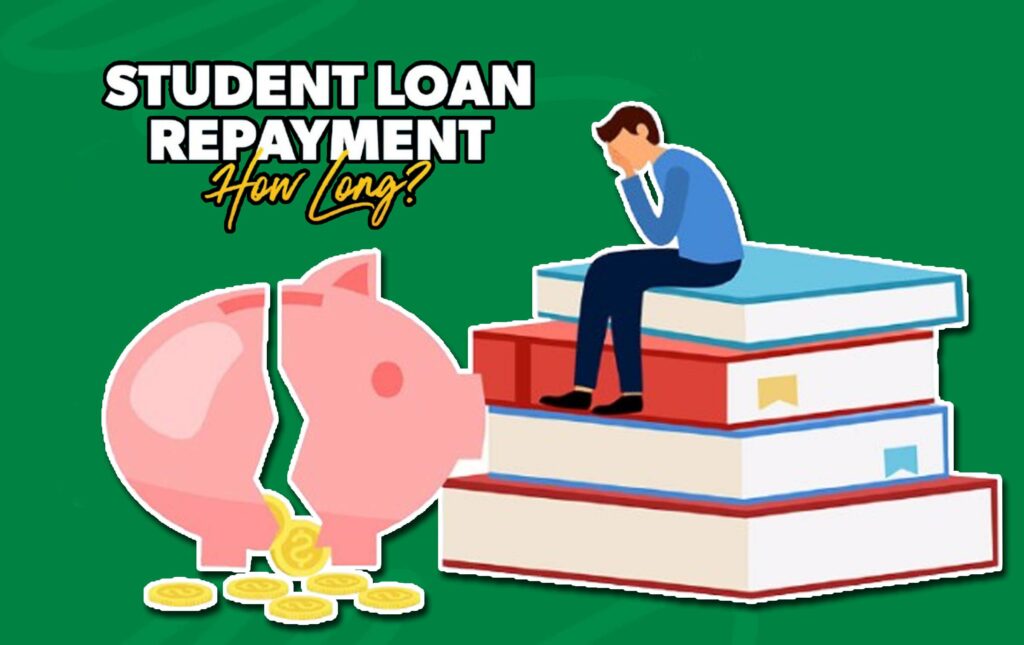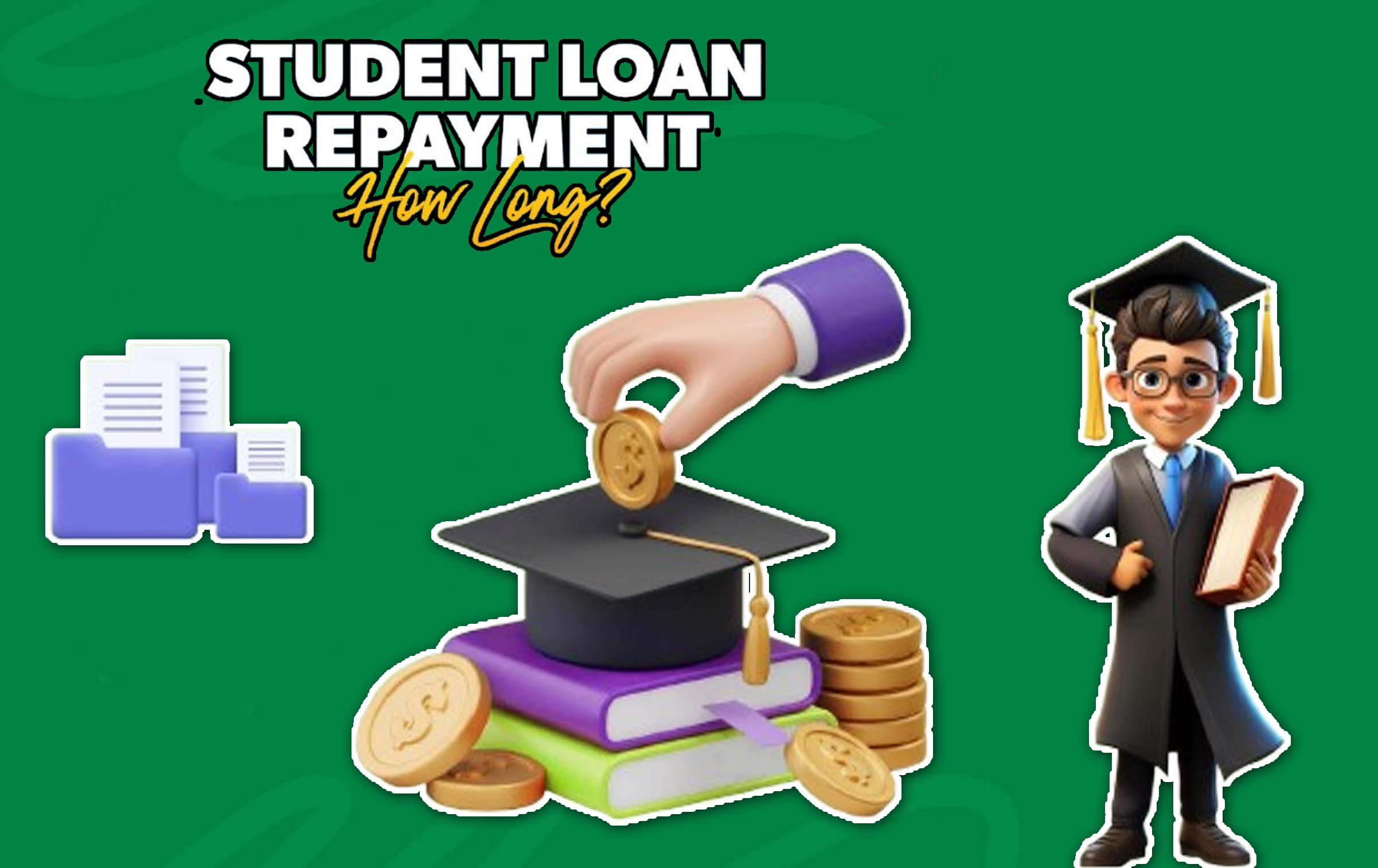How Long Does It Take to Pay Off a Student Loan? The duration for repaying a student loan depends on various factors such as the total loan amount, the size of your monthly payments, and the interest rate applied. The repayment plan you select also plays a major role in determining how long it will take to fully pay off the loan.

For federal student loans, repayment terms usually range between 10 and 30 years. However, private student loans often have different timelines based on the policies of individual lenders. Continue reading to discover the key factors that influence how quickly you can pay off your student loan.
Average Time to Pay off a Student Loan
Federal student loans usually have repayment terms between 10 and 30 years. By default, they are set to a standard 10-year plan unless you decide to go for a different one.
This 10-year repayment plan usually means higher monthly payments, prompting many borrowers to pick very long repayment terms. Research shows that, on average, it takes borrowers approximately 21.1 years to fully repay their student loans.
Factors that affect how long it takes to pay off a student loan
There are lots of factors that play a huge role in the time to pay off your student loan. Some of which includes your loan amount, repayment plan, interest rates, and your income. Let’s dive into the details of how these factors play into how long it takes to pay off your student loan.
Loan Amounts
The overall size of your student loan debt can significantly influence how long it takes to repay. Larger loan amounts with higher monthly payments can injure your budget, leaving less money for other expenses. If your budget is tight, making extra payments to pay off the loan faster may be quite difficult.
Repayment plan
How long it takes to pay off student loans largely depends on the repayment plan you go for. Just like I have mentioned earlier, federal student loans offer plans ranging from 10 to 30 years, while private loans have varying terms based on the lender the student went for.
Interest rates
Interest rates influence both the overall cost of your loan and the amount of your monthly payments. A higher interest rate means it can take longer to pay off your loan, depending on your income and budget. Over the past few years, student loan interest rates have been increasing.
Refinancing student loans
Refinancing involves taking out a new private student loan to replace your existing loans. This process provides you with new loan terms, a different interest rate, and often a new lender.
Refinancing can affect the repayment duration of your student loans. You may choose a shorter term with higher monthly payments or lengthen the term to reduce your monthly payments. However, lengthening the term usually results in paying more interest throughout the life of the loan.
Changing your payment schedule
Adjusting your payment schedule can speed up paying off your loans. For example, if you pay every three weeks or biweekly, you’ll reduce the time it takes to pay the loans. Making 26 half-payments per year is equivalent to 13 full payments—essentially one extra payment annually. Over time, this strategy can help shorten your repayment period by about three months if followed for three years.
On the other hand, consistently missing payments or failing to pay the full amount can extend the length of your loan. It may also lead to late fees and negatively impact your credit score.
Income
If you have a high income, you likely have room in your budget to make extra payments toward your loan. Paying more than the minimum amount can lower the total interest you’ll pay and shorten the time it takes to fully repay your loan.
Federal Student Loan Repayment Options
Standard 10-Year Repayment Plan
The standard 10-year plan has a set interest rate and fixed monthly payments. It’s the default plan unless you go for another option.
Graduated Repayment Plan
It usually lasts about 10 years but can be extended up to 30 years for consolidation loans. The plan starts with lower monthly payments that rise every two years.
Extended Repayment Plan
This repayment plan generally spans about 25 years and offers either fixed payments or graduated payments that increase over time. To be eligible, you must have more than $30,000 in outstanding Direct or FFEL loans.
Income-Driven Repayment Plans
Income-driven repayment (IDR) plans for federal student loans have you pay off percentage of your discretionary income for a fixed period. After this time, any remaining loan balance will be forgiven. IDR plans adjust payments based on your monthly income and your dependants, making them more affordable options.
Private Student Loan repayment options
Private student loan lenders set their own interest rates and repayment terms, so the time it takes to repay your loan depends on the specific loan you choose and the options provided by the lender.
Generally, private student loans offer repayment terms of up to 15 years or even longer. However, since many borrowers aim to repay their loans quickly, you can also come across private student loans with shorter terms, sometimes for as short as 5 years.
Bottom Line
In conclusion, the time it takes to pay off your student loan debt depends on how much you owe, your interest rate, and your repayment plan. This means you have the power to decide how fast you become debt-free, but your income and budget will set limits.
Some borrowers are best served by quickly paying their student loans, while others benefit more from a repayment plan with lower monthly payments, such as IDR. Explore the options you have to find the best way to repay your student loans on a schedule that matches your needs.

